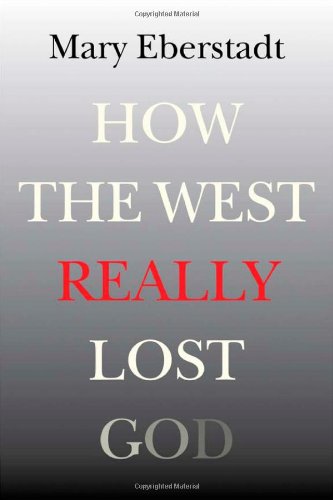How West Really Lost Secularization

For those Christians wishing to gain significant insight into the current state of American culture, this is a must read. Eberstadt's original and highly plausible view on the secularization of America is a significant addition to the sociological conversation. But it is also, without question, a superbly documented and cogently argued commentary on the demise of the family and Christianity, though without leaving Christians feeling utterly hopeless.
Her primary audience is not your average reader, but she writes in an accessible enough fashion that all are welcome. Written from a sociologists perspective and style, not only does she make the case that "family decline helps to power religious decline," she also writes as a Roman Catholic Christian and bolsters the case for the Church (and society as a whole) to return to a robust value of the traditional family by letting the empirical evidence speak for itself. (I am a conservative Confessional Lutheran, LCMS, and did recognize her Catholic dispositions, but I was not too put out by them as she strived for objectivity for the most part.)
Her basic premise is that faith (Judeo Christianity) and the family form an interwoven "double helix." Where one goes, the other is sure to follow. In other words, it is not just as Christianity goes so goes the family. But the reverse as well--as the family goes, so goes Christianity. "What this book means to impress is that faith and family are the invisible double helix of society--two spirals that when linked to one another can effectively reproduce, but whose strength and momentum depend on one another" (p. 22). Thus, where American society is riddled by broken families, nontraditional families, and anti-family segments, there is apt demonstration of why America is becoming increasingly secular. That is, the family unit is no longer solidified by the Christian message nor, correspondingly, is it propagating the Christian message and morals as the nuclear whole that it once was.
Eberstadt by no means aims to reduce Christianity to the family alone, nor does she aim to undermine the power of "the Word" in creating the Church. In fact, the astute Christian reader will hear her brief but clear deference for the work of the Holy Spirit. And it should be made clear this is by no means any type of theological treatise. Nonetheless, she provides invaluable sociological "empirical" evidence for Christians to draw upon in order to intelligibly speak about the maladies of our culture as it impacts both the Church and the family, very often in parallel manners.
In provocatively clear fashion, she details, among other things, not only how the development of social issues such as divorce, birth control, and homosexuality have impacted the makeup, reconstitution, and absence of the family, but how, wittingly and unwittingly, the Church (among various denominations) has actually changed course and fostered these developments to its own demise.
In the end, Eberstadt provides a hearty diagnostic as well as a simple but profound remedy for what ails the collective family and Church: "If there is a family renaissance, there may be a religious renaissance too. And a religious renaissance in turn would make that family renaissance stronger for the same reasons already seen." (p. 198).
Tidak ada komentar:
Posting Komentar